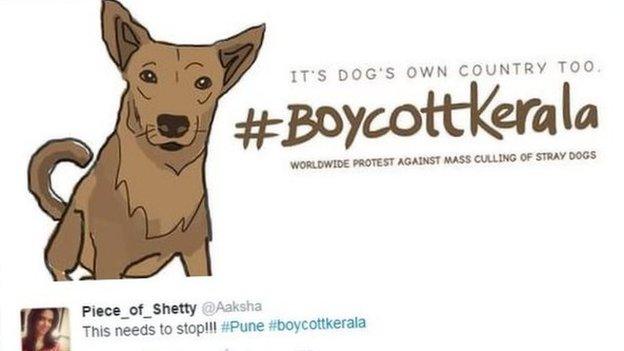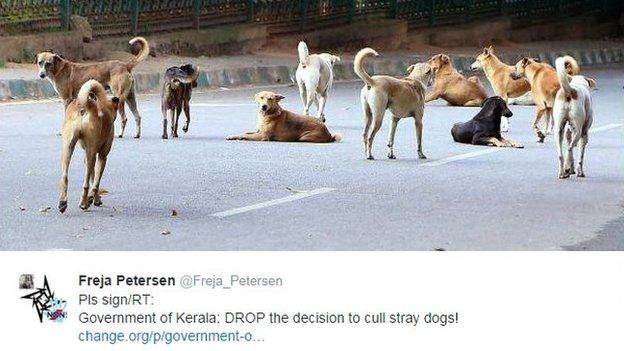How far will India's dog-lovers go to save strays?
- Published

If you're thinking of holidaying in Kerala, as millions do each year, be careful before typing "Kerala tourism" into Twitter.
Of course, you'll see pictures of the tropical evergreen forests and spectacular sandy beaches for which it is famous. But what may catch you off-guard are hundreds of photographs of dead dogs, most with an accompanying hashtag - #BoycottKerala - which has appeared thousands of times on Twitter in recent weeks.
Why? Well, according to local reports around 200,000 stray dogs roam freely in Kerala. "There is a lot of fear coupled with panic," Sneha Koshy, a journalist with NDTV, tells BBC Trending, though she is unsure how much of it is justified. "Almost everybody is saying you know we can't go here for a walk, we can't go there for a meal. We can't go out in the night without a car." The news is awash with stories with reports of people being bitten by the dogs, she says.
In response to the reports, the Keralan government outlined plans to cull the dogs. Whether regional authorities have the right to order the killing of stray dogs is currently a matter of legal dispute, external, and India's supreme court is expected to make a decision on the matter in September.
Dog-lovers and organised animal rights groups are using social media to put pressure on the authorities in Kerala not to undertake a mass culling. Much of the activism comes from Delhi - 1,200 miles (2,000 kilometres) distant from Kerala.
A campaign with its own hashtag, "Boycott Kerala" aims to hit the tourism-dependant state where it hurts most. The tag is being used to target tourist information accounts, such as the Kerala Tourist Board. "Come visit Kerala and see how man's best friend is treated," reads one typical post, accompanied with an image of slaughtered dogs. "Boycott Kerala tourism now that the government is brutally killing street dogs," says another. An online petition, external calling for the dogs to be saved has received more than 50,000 signatures.
Activist Rishi Dev, explained the rationale behind the campaign. "We are not going to participate in any kind of trade with Kerala if shooting goes on, if public culling goes on," he says. Doesn't this risk damaging the state and the country's economy? "It will not damage the economy of the region, it is only going to start a dialogue, which is what it has done," he says. "Is there any other way the government is going to listen?"
Some animal rights groups went further, however. One went as far as calling for people to make fake bookings in Kerala hotels, and then cancel, to cause disruption.
A rival hashtag - #BoycottHate - has now emerged, and being used by people who think the campaign represents a huge overreaction.

There's another twist in the tale: the cull hasn't happened yet, at least according to the authorities. Despite the huge social media reaction, it remains by and large still a proposal. No major action has been taken so far.
Given that, it isn't clear where the images of dead dogs that appear on social media are from. Some could be genuine - a result of small-scale unofficial killings. There have been claims that a handful of the images weren't taken in Kerala at all, but are actually from Pakistan.
On the other hand, there's little sign that anyone is actually boycotting the beaches of Kerala. Officials say the "Boycott Kerala" campaign hasn't had any noticeable effect on tourism yet.
Next story: Bloggers react: 'There isn't an inch of safe space in Bangladesh'

Niloy Neel was an atheist from a Hindu background
Bangladesh's small community of online atheists is in shock after another blogger was murdered - and many are focussing in on one particular detail of the killing. READ MORE
You can follow BBC Trending on Twitter @BBCtrending, external, and find us on Facebook, external. All our stories are at bbc.com/trending.